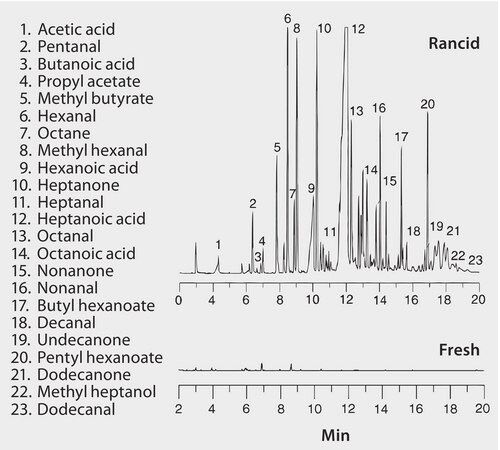GC Analysis of Fresh and Rancid Potato Chips on SPB®-1 SULFUR after SPME using 50/30 μm DVB/Carboxen/PDMS Fiber

Materials
analytical column
Related product
SPME fiber
SPME fiber assembly Divinylbenzene/Carboxen/Polydimethylsiloxane (DVB/CAR/PDMS)
needle size 24 ga, for use with manual holderstandard
CONDITIONS
sample/matrix
3 g crushed potato chips in 15 mL vial
SPME fiber
DVB/Carboxen/PDMS, 50/30 μm, StableFlex (57328-U)
extraction
headspace, 65 °C, 20 min, with stirring
desorption process
3 min, 250 °C
column
SPB-1 SULFUR, 30 m × 0.32 mm I.D., 4.0 μm (24158)
inj. temp.
250 °C
oven
45 °C (1.5 min) to 250 °C at 12 °C/min, hold 10 min
detector
quadrupole mass spectrometer, m/z = 35-290 at 0.6 sec/scan
carrier gas
helium, 40 cm/sec
injection
Splitless/split, closed 2 min
liner
0.75 mm liner
sample
3g crushed potato chips in 15 mL vial
Description
Analysis Note
Potato chips can contain up to 50% oil and are subject to rancidity. Aldehydes, particularly hexanal and heptanal, are formed from fatty acids that are cleaved at the double bonds when exposed to ultraviolet light and air. A package of 3-year-old potato chips was analyzed using SPME and compared to a fresh package. The presence of aldehydes indicated that the older chips were rancid. However, due to the age of the chips, further oxidation of the aldehydes occurred that resulted in the formation of hexanoic and heptanoic acids. A Carboxen/PDMS/DVB fiber was inserted into the headspace of the potato chip samples at 65 °C for 20 minutes with agitation. The fiber was then analyzed using GC/MS on a SPB-1 SULFUR column. This non-polar column has a thick film and is ideal for smaller molecules.
Legal Information
SPB is a registered trademark of Merck KGaA, Darmstadt, Germany